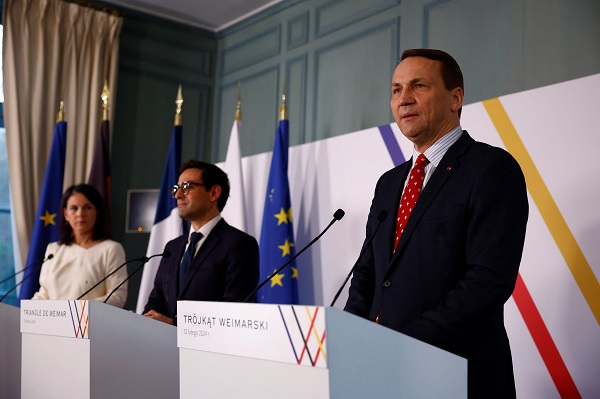 German, French and Polish Foreign Ministers attend a joint press conference after their Weimar Triangle talks at Chateau de La Celle Saint-Cloud near Paris, France, 12 February 2024;
Credit: Reuters/Sarah Meyssonnier/Pool
German, French and Polish Foreign Ministers attend a joint press conference after their Weimar Triangle talks at Chateau de La Celle Saint-Cloud near Paris, France, 12 February 2024;
Credit: Reuters/Sarah Meyssonnier/Pool
LA CELLE SAINT-CLOUD, France (Reuters) - On Monday 12 February 2024, France, Poland and Germany accused Russia of putting together an elaborate network of websites to spread pro-Russian propaganda to undermine their governments, warning of a mass spread of such content ahead of EU elections in June.
Western nations have repeatedly accused Russian operatives of using social media and the internet to spread false or misleading information to undermine them, promote Russia or attempt to sway public opinion in their countries against backing Ukraine in its fight against Russia's invasion.
"We are in a period of vulnerability with the European elections and, regarding France, the Olympics," French Foreign Minister Stephane Sejourne told a joint news conference with his Polish and German counterparts at a French chateau near Paris.
The ministers said they had created a joint mechanism to detect and respond to potential Russian internet attacks.
They met as part of efforts to reinvigorate the "Weimar Triangle" platform of political cooperation between Germany, France and Poland created in 1991.
In a media briefing ahead of the meeting, French diplomatic sources said VIGINUM, the French watchdog that monitors foreign digital interference, had identified some 193 websites that aimed to broadly spread information from pro-Russian sources as well as Russian news outlets and institutions.
"The objective seems to be to cover the Russo-Ukraine conflict by presenting the 'special military operation' positively and denigrating Ukraine and its leaders," a French diplomat said, referring to Moscow's term for the invasion.
The Kremlin has repeatedly denied accusations of spreading false or misleading information. After the last European Parliament elections in 2019, Russia's Security Council described allegations that Moscow had propagated disinformation to sway voters as absurd.
France has in particular called out Russian activities in Africa, saying that Moscow-linked actors have tried to discredit Paris in West Africa, saturating regular media and social media.
'Attacks on our democracy"
That has prompted multi-faceted actions by France to reverse an anti-French narrative that has damaged its influence and interests, including with a unit dedicated in part to spotting and dealing with malicious content.
The diplomats said that unlike in previous disinformation campaigns, the internet Portal Kombat, as dubbed by France, aims to attract people to these sites, some with local domain names, so that information could then be spread locally.
"These are attacks on our democracy," German Foreign Minister Annalena Baerbock said, adding that the European Union could not allow people's confidence to be undermined.
French officials said that so far the websites in question had made few inroads. But their concern is that with the two-year anniversary of the Ukraine war, elections in Russia, the EU and the United States, and the Olympic Games all occurring this year, the websites were being put in place so that when the time came they could spread large amounts of harmful information.
"We are expecting an acceleration of different Russian actions and even widespread dissemination, so this is a reason to bring this to attention now," a French military official said.
An example of such activity on Monday cited by diplomats was an article that appeared on one of the websites, entitled "That's enough!: France calls for radical measures against [Ukrainian President Volodymyr] Zelenskiy".
The article referred to a post on social media platform X of a far-right French opposition politician who has pro-Russian leanings.








